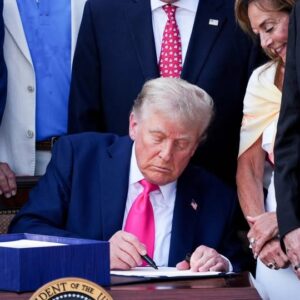The Supreme Court has granted the Trump administration permission to deport a group of eight immigrants currently detained at a U.S. military base in Djibouti to South Sudan. In a brief, unsigned opinion issued Friday, the justices affirmed that their earlier stay of a Massachusetts federal judge’s order applies in full to the case. This decision effectively overrides a lower court’s restrictions on deporting immigrants to countries not explicitly named in their removal orders. The ruling marks a significant development in the administration’s broader efforts to expand the scope of so-called “third-country” deportations—a practice that allows immigrants to be sent to nations other than their countries of origin.
The Supreme Court’s order follows a series of legal disputes surrounding a ruling by U.S. District Judge Brian Murphy. On April 18, Murphy had barred the federal government from deporting individuals to third countries unless it first ensured, through specific procedural safeguards, that deportees would not face torture upon return. When the government attempted to send eight men to South Sudan in violation of that order, Murphy issued another decision on May 21, declaring that the administration had acted unlawfully. His concerns were grounded in the State Department’s warnings about South Sudan’s instability, where armed conflict, crime, and kidnappings pose severe risks. The deportation flight was ultimately diverted to Djibouti, where the eight immigrants have since been held at a U.S. military facility.
Seeking to overturn Murphy’s restrictions, the Trump administration appealed to the Supreme Court on May 27. Solicitor General D. John Sauer argued that Murphy’s judicially imposed procedures were creating “havoc” in the government’s deportation system and disrupting sensitive diplomatic and national security operations. The administration insisted that the lower court’s interference was preventing it from exercising lawful discretion over immigration enforcement. By contrast, attorneys representing the immigrants contended that Murphy’s order did not prohibit deportations outright—it merely required the government to comply with statutory protections against torture and inhumane treatment.
When the Supreme Court initially stayed Murphy’s injunction on June 23, ambiguity remained over whether the ruling applied to the eight detainees in Djibouti. Murphy maintained that his May 21 order still protected them. The administration quickly returned to the Supreme Court, seeking clarification and accusing the judge of “unprecedented defiance” of the Court’s authority. The justices’ latest order resolved that uncertainty, declaring that their June 23 decision had fully suspended Murphy’s injunction and rendered his subsequent rulings unenforceable. In other words, the administration was free to proceed with the removals while the underlying legal case continues.
The decision exposed a familiar ideological divide on the Court. The unsigned majority opinion was supported by the Court’s conservative justices, including Elena Kagan, who said that although she had disagreed with the initial decision to allow third-country deportations, she recognized that the Supreme Court’s stay order prevented lower courts from enforcing contrary rulings. Liberal justices Sonia Sotomayor and Ketanji Brown Jackson dissented sharply. Sotomayor condemned the majority for enabling what she described as unlawful and potentially life-threatening deportations. She warned that the government was seeking to “turn over [the immigrants] to local authorities without regard for the likelihood that they will face torture or death” in South Sudan.
Sotomayor further criticized the Court for what she called an “indefensible” lack of transparency, arguing that the justices had failed to adequately justify their decisions while faulting lower courts for misunderstanding them. Her dissent underscored the gravity of the case, which touches on fundamental questions of human rights, executive power, and judicial oversight. The eight men—believed to be from Cuba, Vietnam, and Laos—remain at the center of an unfolding legal and moral controversy. The Supreme Court’s latest order not only grants the administration authority to act but also signals a broader shift toward deference to executive discretion in immigration enforcement. As the legal battle continues, the case highlights the ongoing tension between national security priorities and America’s commitments to humanitarian principles under both domestic and international law.





